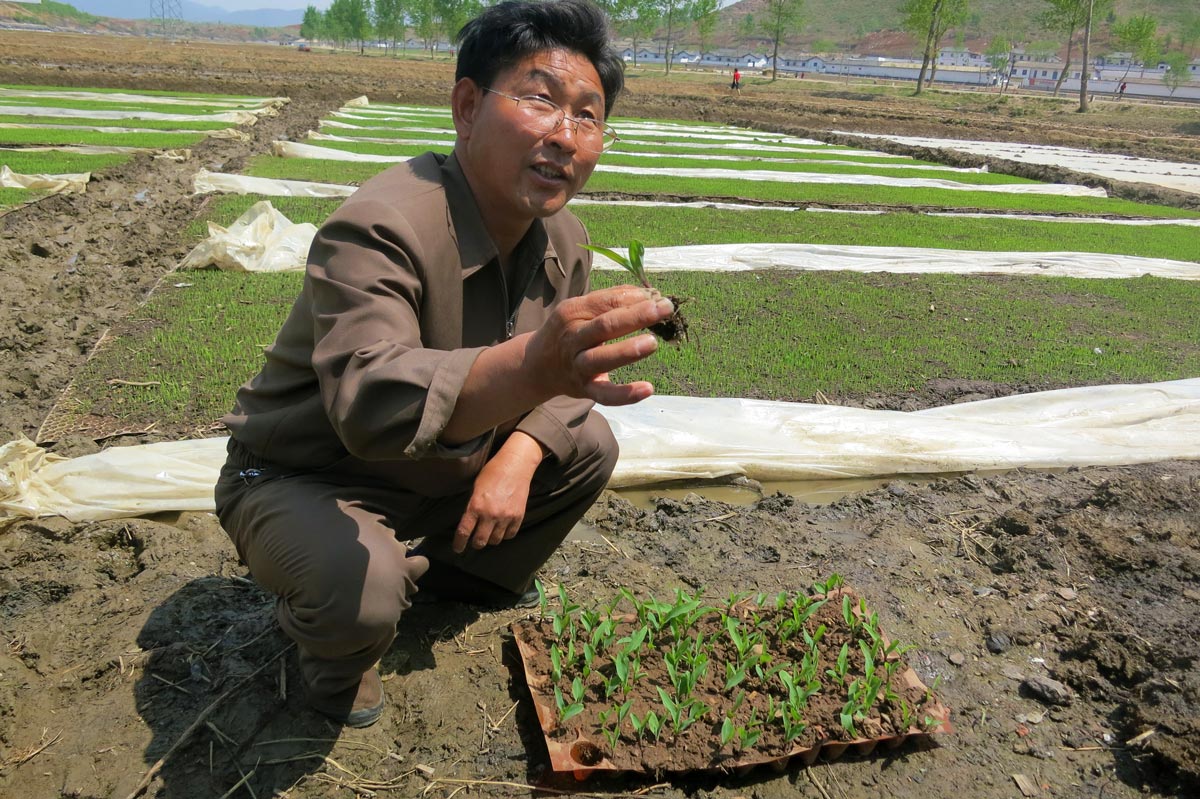
A farmer in North Korea demonstrates to AFSC staff in a 2012 visit how imported plastic trays are being used to help grow corn seedlings more efficiently. Photo: AFSC
WASHINGTON, DC (December 20, 2022) Today, the U.S. Government issued a series of licenses to advance UN Security Council Resolution 2664 and to apply the guidelines it outlines to all U.S. sanctions regimes. This move follows the successful passage of the UN resolution earlier this month, which exempts humanitarian and peacebuilding work from UN sanctions. The American Friends Service Committee (AFSC) – a Quaker organization that has long opposed the use of sanctions that impact general populations and hinder humanitarian and peacebuilding efforts – applauded these steps. The licenses issued today authorize the delivery of food and medicine, disaster relief, democracy building programs, human rights work, education support, non-commercial development, environmental and natural resource protection, and peacebuilding and conflict prevention in sanctioned areas. They will save the lives of countless vulnerable people.
“AFSC has pushed for these changes for decades and we warmly welcome this shift in U.S. policy,” said Aura Kanegis, AFSC’s Director for Policy and Advocacy. “From Iraq in the 1990s to Afghanistan, Somalia, Syria, Yemen, North Korea, and beyond, we have witnessed the terrible human cost of sanctions. Hundreds of thousands of people have lost their lives because blunt sanctions regimes stopped life-saving assistance. These licenses are an important step towards protecting people and ensuring that their basic needs are met.”
AFSC has often been a lone voice in calling for humanitarian access to places that are under sanction by the United States. The organization was the first NGO to enter the Democratic People’s Republic of Korea (North Korea) in 1980 and has a long history of navigating the difficulties of working in sanctioned countries. Because of the restrictions imposed by broad based sanctions, AFSC has often had difficulty delivering critical aid.
In 2000, AFSC's Campaign of Conscience for the Iraqi People provided water filtration equipment to Iraqi hospitals and rehabilitated a water treatment plant serving five schools and many villages, deliberately violating sanctions and risking fines of up to a million dollars from the U.S. Treasury Department. Since that time the organization has worked to highlight the ways that sanctions policies implemented without carve-outs for humanitarian and peacebuilding efforts do great harm while having little impact on the political situations they purport to challenge. In recent years, AFSC played an instrumental role in starting the Lift Sanctions Save Lives network, which brought together humanitarian, research, peacebuilding, faith-based, human rights, and other civil society organizations to advocate for changes to sanctions policy.
“These changes will result in organizations like ours being able to put more resources toward work that saves and improves lives rather than navigating byzantine administrative procedures to navigate sanctions on a case-by-case basis,” said Kerri Kennedy, AFSC’s Associate General Secretary for International Programs. “This change represents an important practical approach to address the tremendous unintended consequences of sanctions policies. AFSC has long advocated for an end to broad based sanctions that negatively impact the most vulnerable and disrupt humanitarian aid.”
AFSC currently has programs in North Korea, Somalia, and South Sudan, all of which are subject to sanctions regimes. The legal hurdles involved in working in sanctioned areas are tremendous, and delays draw out for many months or years, with an incredible human cost.
“Today we want to thank the U.S government for taking this long overdue step towards corrective sanctions policies,” said Michael Merryman-Lotze, Middle East Program Director for AFSC. “But there is still work to be done. Companion efforts to protect humanitarian, human rights, and peacebuilding work in areas subject to the ‘material support for terrorism’ statute are needed, as are steps to better enable financial transfers into sanctions-impacted areas. We are asking the U.S. government to continue and expand protections for lifesaving humanitarian, human rights, and peacebuilding work.”
###
The American Friends Service Committee (AFSC) promotes a world free of violence, inequality, and oppression. Guided by the Quaker belief in the divine light within each person, we nurture the seeds of change and the respect for human life to fundamentally transform our societies and institutions.